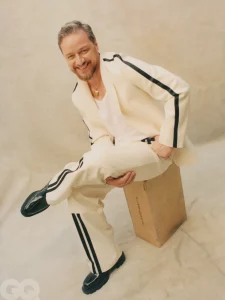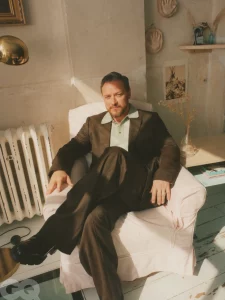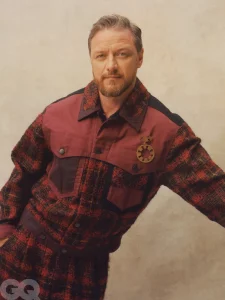
James McAvoy is recounting his favourite Soccer Aid memory as the nail technician applies a layer of clear strengthener to the gnawed-down nubs where his fingernails should be. “We’re winning 3-1 in the 90th minute, and José [Mourinho] goes, ‘I want you to get into the centre circle and go down like you’ve been shot’,” he says. “‘No matter what, you do not move an inch until we fucking drag you off that pitch, and you take your time getting off.’” McAvoy is a stalwart of the charity football competition, but the year Mourinho coached the World XI felt different. He got something that every fan covets – a direct insight into the José Mourinho school of shithousery. Back in 2006 when he was filming Atonement in Redcar, North Yorkshire, he had seen a group of Chelsea players – who were staying in the same hotel ahead of a game against Middlesbrough – doing keepy-uppies in a circle, with the manager in the middle making them all laugh. It gave him clarity on that increasingly elusive hold he has on his players.
“I could see why they’d run through walls for him,” McAvoy says. When the time came, he did what he was told and they saw the game out, the Mourinho way. Now, a photo of the coach whispering “dark arts” into his ear sits framed in his home. “It’s my proudest footballing moment.”
We’re on our second, not-complimentary, glass of prosecco in a Waitrose-tier nail salon in Islington on one of those gross, worryingly hot days in early August. The aforementioned nail tech, Rebecca, is politely pretending not to know who McAvoy is, and pretending, less convincingly, not to eavesdrop. “Are you from Scotland?” she asks at one point. Aye. McAvoy wanted to go for mani-pedis because the feeling of the strengthener on his teeth alone is enough to stop him from stress-chewing his nails to bits, which he tends to do absentmindedly while watching Celtic matches. And, he says, his kids like it when he gets his toenails painted. And, let’s be honest, it feels nice.
McAvoy is built like a pitbull terrier who deadlifts – all neck, shoulders and thighs. But wearing sandals, shorts and sunglasses, he looks like a dad on holiday, probably because he is a dad on holiday – he’s taking some time to do nothing after wrapping up on His Dark Materials season three, which will release in December. When we meet, he doesn’t have his next project lined up. “I quite like that,” he says. “I quite like being available.”
McAvoy first got jacked in 2017 at the age of 38, after coming up against an illness that nearly killed him. It wasn’t the sarcoidosis – a condition where small patches of swollen tissue develop in the body – that nearly did him in, but a botched biopsy which led to an infected surgery scar. His lungs collapsed, and he woke up in the middle of the night on his own, barely able to speak to the person on the end of the line at 111. “I didn’t get an epiphany of like, every day is so precious, I need to live it to the max. It’s not like that.”

But it did lead to a greater appreciation of his physical capabilities when he was finally able to work out again. “I couldn’t run to the end of the road and back for like, four or five months. But weirdly, I could lift fucking 160 kilos.” Just three weeks after his three-week stint in hospital, he began prep for M Night Shyamalan’s Glass, which required him to get in proper shape – in order to play The Beast, a character who spends a lot of the movie shirtless. He hit the gym ceaselessly with coach Magnus Lygdback, despite his ailing body. “He was also kind of rehabilitating me as well. It was kind of perfect timing.” And then, as he puts it, his body just didn’t change back. “My neck and shoulders just stayed big.” Increasingly he found playing football two to three times a week would land him with long-lasting injuries that would keep him out of action for months. So he kept on lifting and getting more hench.
McAvoy is so reticent to say anything vaguely resembling a cliché that he plays down the impact that brush with mortality had on him. But over the course of our conversation I get the sense that it did, in some way, realign his life. He speaks about his work now with a level of detachment, about doing things not for the pay, nor the gravitas, not even for fulfilment, but for fun. “I’m getting long in the tooth,” he says, gesturing toward his 27-year career. “I love doing it, but I don’t love the daily grind of the film and telly business. Even if it’s a good script, I certainly can’t rationalise going to work at five or six in the morning and staying out till eight o’clock at night. If my character hasn’t got an interesting part in telling that story it’s quite soul destroying. More and more I’m looking for interesting experiences.”
Then again, maybe McAvoy has always been like that – a bit removed from the rigmarole of his industry. 2008 should have been his Oscars year, really. Atonement was a gamechanger – a massive hit both critically and commercially, and one which cast him in a new light as a romantic lead, and he’d been just shy of a Best Supporting Actor nomination for The Last King of Scotland the year before. But, having gone along for the ride to support Forest Whitaker in his own successful bid to win Best Actor, he was all too aware of the schmoozing and arse-kissing required to get over the line. “[With the Last King of Scotland campaign], it was made clear to me that I was doing it for the benefit of other people. And I was totally down with that. But by the time Atonement came along, I was 26 or 27, and I was just like, I can’t do it, I’m not doing it, I don’t wanna do it.” He found himself at a crossroads: if he played along, the Oscar could have catapulted him into an entirely different echelon of fame. But he opted out. “I didn’t want to play that part. I’ll push the film, I’ll try and get bums on seats. But the campaign, I felt… I felt cheap.” He was lucky, he admits. He had already carved out a place for himself by that point, and the jobs weren’t going to dry up just because he wouldn’t pretend to laugh at the jokes from a member of the Hollywood Foreign Press Association.
Of course, you wouldn’t really know any of that by looking at the arc of his career. A little while after Atonement McAvoy made the first of four X-Men movies, playing a younger version of Patrick Stewart’s Professor Charles Xavier. He had a lot of fun doing them, and wants to dispel the rumours on the internet that he didn’t enjoy his time, or harbours negative feelings toward the Marvel machine. “It was one of the most positive experiences I’ve had with a studio. I don’t really [see them as just] money gigs. Days of Future Past I think is one of the better films that I’ve been involved in.” He does have one note, though. “My biggest criticism of what we did throughout the four movies was that after the first movie, we didn’t take advantage of the relationship between [Xavier and Michael Fassbender’s Magneto], which really formed the backbone of the first film. So it was like, why did we just eject that massive weapon?”
Why, then, do the fans get the impression he wants nothing to do with the MCU, which has started to draft in old X-Men characters following Disney’s acquisition of Fox. “I’m very quick to say, ‘No, I’m done.’ Or ‘I’m not that bothered about coming back.’ Because you move forward.” Around the time we chat, rumours are swirling that he’ll be pulled back into the fold for Avengers: Secret Wars, the big centrepiece of the current run of films, which will reportedly see the cameo taps turned all the way on. So, I have to ask: Has Marvel boss Kevin Feige already called him about it? “I’ve definitely not got the call.

And if I did I would definitely not be telling you.” How about the Netflix reboot of The Chronicles of Narnia, which McAvoy pretty sincerely seems to be learning about for the first time when I mention it… Have they asked him to take part? “Have they fuck!”
There’s a James McAvoy story that I love. It’s not the one about him getting picked up and licked on the face by a drunk fan on a night out Glasgow in the early ’00s, though I do love that, too. Nor the one where a fan tries to get him to sign a Funko Pop of another actor. This one, the M&S story, has 80,000 likes on Twitter. I’ll let the original tweeter explain it: “Just been reminded of the time my aunty and her pal met james mcavoy in m&s on byres road and she went ‘oh god i bet this is your nightmare, two middle aged mums following you around the supermarket’ and he looked her dead in the eye and said ‘actually… it’s my biggest fantasy’”. McAvoy laughs when I recount this to him verbatim. “It’s definitely not my ultimate fantasy. I do not remember this.” He doesn’t dispute that it happened, though. “I’m glad that somebody actually hears the shit I say to them, because usually people always look glazed when I say things to ’em that I think is witty.” His favourite bit, when he gets the “Where do I know you from?” treatment, is to respond completely blank-faced that he does a lot of gay porn. “It’s usually when they’re standing with their wives. Honestly, I think that’s hilarious, but [they give me] nothing. Come on!”
McAvoy is deeply Glaswegian. It’s in his bones and, sometimes, on his toes (the last time he got a pedicure, he had them done in Celtic colours). A week before our meeting, he was on the pitch at Celtic Park with his son before the first game of the season. He goes back regularly, though he now lives in London. Earlier this year, he took his West-End play Cyrano de Bergerac to do a two-week run there. I wonder if it felt celebratory, like a homecoming. For the first time in our conversation, he hesitates. “The cast were amazing, it was brilliant. But I was really saddened, to be honest with you, because most of the women of colour in the cast got racially abused pretty much on a daily basis when we were there.” The abuse, he says, was sexually explicit and violent, and entirely directed toward female actors. “I was just really saddened. I was absolutely shocked and dismayed and to use a Scottish word, scunnered.” It should have been a celebration for him, but he couldn’t wait to get out of there. “We were delighted to get to Brooklyn [where the play was to move to next], and leave Glasgow. It was horrible.”
He was debating whether or not to tell the story, because he knows how it could go down at home. “The narrative that Scottish people and the Scottish media want to hear when one of us has gone away and done all right, they like you to be back at home and go ‘It’s rare. It’s fantastic. I’m chuffed to be here and there’s no crowd like a Scottish crowd’. But I was going on stage every night going, I don’t want us to be here. I brought this cast here and I don’t want to be here.”
I feel bad when Rebecca compliments my nails and says nothing about McAvoy’s. His are nice until he chomps them down, I suggest. She asks whether he bites the skin. “Yeah. Skin, cuticles, nails.” Oh, but you should see his toenails – they look great, presumably because he can’t quite get to them. Rebecca paints them blue, white and red, the colours of the French flag, which he’ll parade around the beaches of southern France on his upcoming holiday.
Our fingernail polish is drying now. In a few minutes we’ll have to slip back out into the sweaty streets. Thinking back to what he told me about opting out of the awards schmoozing, I wonder if there was a point at which he decided, early on in his career, that he wasn’t going to go in for the fakery that likely pervades the industry and stay true to himself – as cheesy at that sounds. “I was always more stridently like that [at the beginning of my career],” he says. “I don’t have to strive to be like that anymore. I was maybe making more grand gestures of ‘being myself’, which in itself probably isn’t being yourself. But I was always very concerned about getting carried away with myself.”

He thinks he was too focused on keeping his head on the right way that he missed out on things he might have enjoyed. “I probably restricted myself a little bit too much up until my thirties. Just in my social life – I probably didn’t let myself enjoy my life as much as I could have done. I think I was worried I was going to get carried away and become some sort of good-time Charlie.” It all comes out in the wash, though. The laser focus he maintained during his 20s and 30s has afforded him the freedom to just vibe out when he wants to. “Now I’m in my 40s and I can take [my work] seriously without taking myself seriously.”
We drain the remnants of our prosecco, shake hands and part ways. The next time I see McAvoy, a few months later, is from afar, at GQ’s Men of the Year party. He is, as John Boyega put it on Instagram, “getting it” on the dancefloor, where he spent most of the night. His bow tie is gone, the collar on his tuxedo shirt is open and his hips are gyrating. He may well have been too buttoned-up, too self-conscious to do this in the early days of his career. But just look at him now.
His Dark Materials season three will air on the BBC in December.
Story by Ben Allen / Source: gq-magazine.co.uk




















Leave a Comment